The Death of The Middle Class
July 19th, 2013 // 10:51 am @ Oliver DeMille
Columnist Joe Klein said on The Chris Matthews Show:
“This is the biggest problem that we’re facing going forward. We were a homogenous, middle class country, by and large, for the fifty years after World War II.
“Now we’re no longer homogenous, and there’s a good aspect to that in that we have become a true multiracial country. But there’s a bad aspect to that, in that the middle class, which was the heart of this country, is beginning to fracture, and to panic, in many ways.
“And unless we figure out a way to find jobs for the vast middle class in this country, it’s going to be really hard to sustain democracy. We now have a plutocracy in this country.”
This is exactly true, and many Americans feel Wall Street and Washington are working together against the middle class.
Worse, many people aren’t sure that any solution is ahead.
Many experts suggest that education can solve the class divide, but the people realize that most schools are actually increasing the gap between elites and the rest.
Modern schooling has become a huge part of the problem, not a solution.
The only real solution is a widespread shift from the employee mentality to entrepreneurship.
As David Ignatius points out, many immigrants to America see the United States as a great place to start businesses.
Sadly, most native-born Americans are afraid of entrepreneurship and feel that jobs should be plentiful—as if it were a birthright.
The future of American freedom hinges on this question: will the current generation of Americans embrace entrepreneurialism, or will we keep whining about Washington while waiting for more jobs to somehow appear?
Is the American spirit dead, or is free enterprise still one of our greatest American traditions?
Only the regular people can make this choice.
***********************************
 Oliver DeMille is the chairman of the Center for Social Leadership and co-creator of Thomas Jefferson Education.
Oliver DeMille is the chairman of the Center for Social Leadership and co-creator of Thomas Jefferson Education.
He is the author of A Thomas Jefferson Education: Teaching a Generation of Leaders for the 21st Century, and The Coming Aristocracy: Education & the Future of Freedom.
Oliver is dedicated to promoting freedom through leadership education. He and his wife Rachel are raising their eight children in Cedar City, Utah.
Category : Aristocracy &Blog &Business &Citizenship &Culture &Current Events &Economics &Entrepreneurship &Featured &Leadership &Producers
A Surprising Choice by America’s Founders
July 18th, 2013 // 10:48 am @ Oliver DeMille
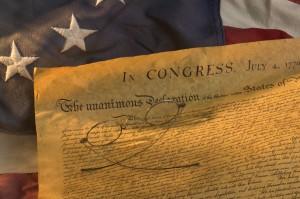 One of the most surprising events in the American founding occurred when the Continental Congress used the word “happiness” in the Declaration of Independence.
One of the most surprising events in the American founding occurred when the Continental Congress used the word “happiness” in the Declaration of Independence.
Up to that point, it was not a word often utilized in great political writings.
Words like “justice,” “liberty,” “property,” “honor,” “power,” “rights” and others were expected in such a document.
But “happiness” was not.
George Washington expressed the American perspective when he said, “the United States came into existence as a nation, and if their citizens should not be completely free and happy, the fault will be entirely their own.”
In this view, a good government protects people’s freedom, and what they do with it is up to them—and determines their happiness.
Still, the very idea that governments are instituted among men to do just this (protect a person’s right to pursue happiness), was a significant thought.
It was certainly not the view of the European aristocrats, who believed that happiness required financial means and the comforts of leisure time and was only meant to be enjoyed by a few.
The American founding generation took a different view.
They believed that happiness was the result of enterprise, and was possible for everyone.
This is a patently American perspective, and it provided a foundation for the whole American freedom experiment.
It is a profound idea.
If happiness is the result of individual actions and choices, then it follows that government’s primary role is to protect the right to act and choose.
Indeed, in such a view, the only purpose of government and law is to keep any person from taking these rights from anyone else—or of enforcing restitution if such protection fails.
This is the proper role of government: to protect inalienable rights (defense), and if this fails to cause restitution (justice).
This was the crux of the American system, the only one that could really be adopted if the goal of government was to protect “life, liberty and the pursuit of happiness.”
In ancient Rome, the Stoics argued that virtue is the cause of happiness, and this same view was promoted by ancient Judaism and early Christianity.
In feudal times, the meaning of happiness switched more to “good fortune,” which took it out of the hands of each individual.
By 1600, however, this was refined to mean “a pleasant and contented mental state.”
The American founding generation added to the meaning of “happiness” with the idea of voluntarily doing important things—from personal morality to economic enterprise, to family relationships, political and military sacrifice, and charitable service.
They also connected these same things to the concept of freedom, thereby forever linking the words “freedom” and ‘happiness.”
This bears repeating, because it is a central foundation of American government, but has been mostly forgotten today.
Specifically, the American founders put forward an amazing new view of government:
The proper role of the government is to protect inalienable rights, and to leave everything else to the people—who will increase or lose their liberty and happiness according to their personal virtue, economic enterprise, family relationships, charitable service, and other voluntary choices.
For the Founders to adopt this view was a remarkable and vitally important turn of world events, and it established a whole new view—and era—of freedom.
To a large extent, we have now lost this view, and our freedoms have decreased with this change.
We now follow the more traditionally European perspective that great changes in society come from the upper class, experts, elections, and government officials and policies.
The Founders disagreed.
They believed that the American Founding was the result of the people, not a few great leaders.
As John Adams responded when someone tried to compliment his role in the founding: “Don’t call me ‘Godlike Adams,’ ‘The Father of His Country,’ ‘The Founder of the American Republic,’ or ‘The Founder of the American Empire.’ These titles belong to no man, but to the American people in general.”
Freedom and happiness are always connected, and they are always up to the regular people, whether they realize it or not.
To the extent that freedom is declining, it is the fault of the regular people.
Our freedoms and happiness are up to us.
If freedom is in decline, we aren’t doing enough.
The good news is that the people have the power to do something about it, no matter how much the experts try to convince us otherwise.
***********************************
 Oliver DeMille is the chairman of the Center for Social Leadership and co-creator of Thomas Jefferson Education.
Oliver DeMille is the chairman of the Center for Social Leadership and co-creator of Thomas Jefferson Education.
He is the author of A Thomas Jefferson Education: Teaching a Generation of Leaders for the 21st Century, and The Coming Aristocracy: Education & the Future of Freedom.
Oliver is dedicated to promoting freedom through leadership education. He and his wife Rachel are raising their eight children in Cedar City, Utah.
Category : Blog &Citizenship &Culture &Featured &Government &History &Leadership &Liberty
Understanding the Battle
July 10th, 2013 // 6:34 pm @ Oliver DeMille
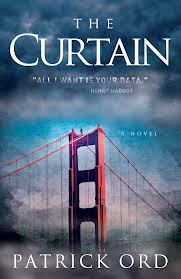 The following describes one side of the modern battle for our future:
The following describes one side of the modern battle for our future:
“You believe you can change the world for good, one person at a time. You prioritize your children and your neighbors above your own consumption.Fulfillment for you comes through love and service, not accumulation of material goods.”
And the next one describes how the other side of the battle attacks the good:
“I’d thought these ideas placed people like you in an emotionally vulnerable position. You strive for an ideal, and since people are inherently imperfect, they will ultimately let you down….
“I obscured the idea of intrinsic self worth by encouraging comparisons with other people—people who were unnaturally perfect because I made them up. I appealed to peoples’ egos as well as their insecurities by promoting the idea that it was not enough to be unique or to do good.
“My intent was to convince them that the only meaningful accomplishment was to be better than someone else. That got them more concerned with promoting a perception of goodness than with actually doing good.”
These profound words, from The Curtain by Patrick Ord (which is a great and fun read), provide a nutshell summary of what is wrong with our modern world and why freedom is in decline.
Let’s be clear.
It is essential to teach our children than being your unique self and doing good really is enough.
In fact, it is what life is all about.
Doing good. Serving others. Improving the world.
Nobody needs to be better than others, we all just need to be the best we can personally be.
We don’t need to be perfect, but we do need to lose our lives in doing good things.
We must never be distracted into promoting a perception of goodness.
We should put all our energy into actually doing good.
Not forcing good through government, but just getting to work helping the world become a better place.
These principles are simple and true.
But the future of freedom depends on most of us really believing and living them.
***********************************
 Oliver DeMille is the chairman of the Center for Social Leadership and co-creator of Thomas Jefferson Education.
Oliver DeMille is the chairman of the Center for Social Leadership and co-creator of Thomas Jefferson Education.
He is the author of A Thomas Jefferson Education: Teaching a Generation of Leaders for the 21st Century, and The Coming Aristocracy: Education & the Future of Freedom.
Oliver is dedicated to promoting freedom through leadership education. He and his wife Rachel are raising their eight children in Cedar City, Utah.
Category : Blog &Book Reviews &Citizenship &Featured &Government &Leadership &Producers &Service &Statesmanship
A Funny Thing Happened on the Way to Big Government
June 17th, 2013 // 12:01 pm @ Oliver DeMille
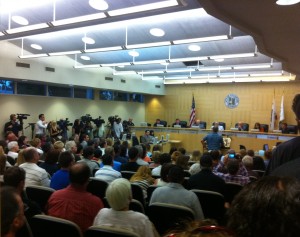 Local government is increasingly the place where things are getting done.
Local government is increasingly the place where things are getting done.
As the party system has created gridlock in Washington, less is getting accomplished on Capitol Hill.
In a funny way, this has created a situation that is more like the American Founding era than anything we’ve experienced in over a century—the real place to get things done in government is at the local and state levels.
The bad news is that Washington continues to spend, borrow, inflate the currency by printing money, and over-regulate in nearly every facet of modern life.
Its growth is slowed by partisan conflicts, but it hasn’t started shrinking.
Not by a long shot.
Another piece of bad news is that the national parties and their teams are pushing their agenda even more vigorously at the local levels.
This means that the party controlling the White House will have a much larger budget and ability to promote national goals in each city, county and state.
The good news is that regular people can have more influence and make more of a difference at the local and even state level.
Most citizens have long felt they can’t really do much to improve Washington—the national government is just too big, too far removed, too immune to change.
But at the local level it’s a different story.
People who really want to get involved can make a major impact on local government.
The key is consistency.
Those who keep at it will eventually learn how to be effective, and as they involve their friends and colleagues they can become a real force for good.
This system, with a lot of citizen involvement at the local level, is what the American founding fathers envisioned.
In a strange way, it is now becoming more of a reality.
As David Brooks wrote in The New York Times, “The happiest people these days are those who leave Washington and get elected mayor or governor. The most frustrated people are people who were mayor and governor and get elected in the Senate. They end each day knowing they were busy. They’re just not sure they accomplished anything.”
Local government is the new power center, and regular people who want to make a real difference can now do so at levels not seen for over a century.
Get involved.
It’s unclear how long this new reality will last, but for now there is a window of power for concerned citizens.
***********************************
 Oliver DeMille is the chairman of the Center for Social Leadership and co-creator of Thomas Jefferson Education.
Oliver DeMille is the chairman of the Center for Social Leadership and co-creator of Thomas Jefferson Education.
He is the author of A Thomas Jefferson Education: Teaching a Generation of Leaders for the 21st Century, and The Coming Aristocracy: Education & the Future of Freedom.
Oliver is dedicated to promoting freedom through leadership education. He and his wife Rachel are raising their eight children in Cedar City, Utah.
Category : Blog &Citizenship &Community &Constitution &Current Events &Featured &Government &Independents &Leadership &Liberty &Mini-Factories &Politics
Summer Reading for YOU
June 14th, 2013 // 10:56 am @ Oliver DeMille
5 Recommended Books for the Summer
by Oliver DeMille
“Dad, can you read to me more?” Meri asked me.
Surprised, I looked up from my book and responded, “Oh, sure.”
I took the book she was reading and read a chapter aloud to her. When I finished, I handed her the book.
“Thanks, Dad,” she said. “I could have read it myself, but I just love it when you read. I mean, in the winter you read to us a lot, and with all our classes and other activities it seems like I learn a lot from you, and all my other teachers.
“In the summer is when Mom reads to us the most, out on the couch on the porch, but I don’t learn as much from other people, and it seems like you don’t read to us as often.”
Meri walked away with her book, but our little conversation got me thinking. I’ve always taught that winter is the key time for family reading. But I think that summer is the most important time for kids to see their parents reading—mainly because they tend to spend less time on official “schooling” activities and more relaxed time with parents (and observing their parents’ leisure activity choices) during the summer months.
When children and youth see their parents reading a lot, they naturally value reading. When children and youth value reading, they read more.
Our choices during summer to make a huge difference in the education of our kids, and one of the most impactful things a parent can do is set the example of reading. If your kids see you reading books a lot, especially during summer leisure, not only are you filling your bucket of ideas and resources, but the example you set can drastically influence them. Reading is powerful!
On the national scale, all free societies are reading societies, and reading starts in the home!
Here’s a great summer reading list* that I’m following. I’m making sure all my children and youth see me reading these books this summer. And I’m really going deep—by reading with a highlighter and pen, taking notes and marking quotes as I go. I’m sharing these books because I hope you’ll do the same:
The Early History of Rome, by Livy
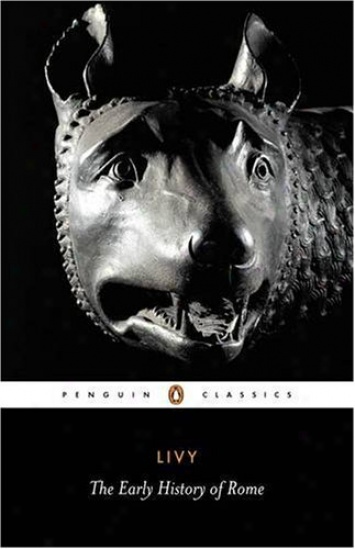 This great book isn’t part of the Great Books of Western Civilization, but it could be. I want my children and youth to see that I care about history, and I’ll look for opportunities to share Livy’s stories with them and talk about the connection between reading history and being successful leaders in life.
This great book isn’t part of the Great Books of Western Civilization, but it could be. I want my children and youth to see that I care about history, and I’ll look for opportunities to share Livy’s stories with them and talk about the connection between reading history and being successful leaders in life.
Rascal, by Chris Brady
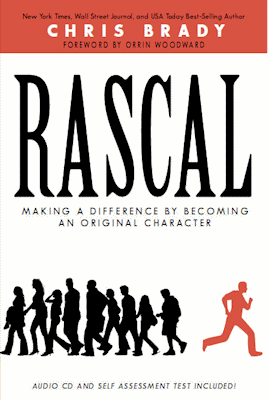 I want my kids to know what a “rascal” is–at least the way Brady defines it. I want them to be the kind of people this book promotes, and I can’t wait for them to ask me about this book.
I want my kids to know what a “rascal” is–at least the way Brady defines it. I want them to be the kind of people this book promotes, and I can’t wait for them to ask me about this book.
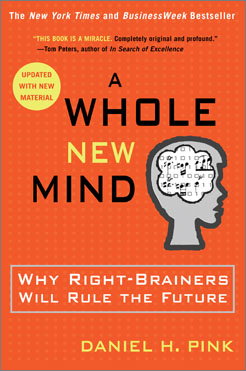 A Whole New Mind, by Daniel Pink
A Whole New Mind, by Daniel Pink
I want my youth to be innovative, creative, and have initiative. This is one of the hardest things to teach, but I’ll look for opportunities to discuss these things as I read this book.
Isaiah, in the Bible
I love sharing scriptural verses with the kids and discussing the meanings and lessons. It leads to a lot of important conversations with the kids about the most important topics.
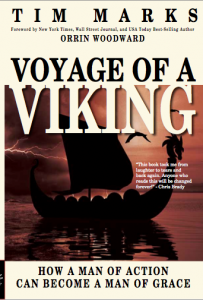 Voyage of a Viking, by Tim Marks
Voyage of a Viking, by Tim Marks
I can’t wait to talk to my kids and youth about this book! It’s about seeking for greatness, learning from your mistakes, not settling for mediocrity, and constantly improving yourself. I know the title of this book will have all my kids asking me questions about it!
Chillin’ and Grillin’
This week I’ve been reading these books in the evenings outside by the grill and the court where the kids play basketball, in the hot afternoons near the swamp cooler, and in the kitchen before meals and during cleanup after the family eats. I’ve taken turns with each book, so I’m a few chapters into all five of them, but I’ve had more than one discussion about each with the kids.
Tonight as dinner started, I got everyone’s attention and said, “I’m reading this awesome book. Actually, I’ve read it before but I’m re-reading it and I want to share something from it that really touched me.”
Everyone quieted down and listened. “Here goes,” I said. Then I read from Voyage of a Viking:
Kids can be pretty relentless in teasing one another, and the kids in my school were no different. I had never before been the subject of teasing and bullying, so it was a new experience for me. You see, news of my parents’ divorce got around town pretty quickly, and it wasn’t too long before the news hit my schoolyard.
The little kids in the family were leaning forward at full attention, and even the teens were paying close attention. I kept reading:
And then the teasing began. ‘There’s Tim, and he doesn’t have a dad,’ the kids would whisper to each other and taunt me.
I stopped reading and asked, “How would that make you feel?”
“I’d hate it!” Meri said forcefully. The other kids agreed.
After they shared their feelings, I asked, “Have you ever been teased like that?” We discussed this for a while, then I asked everyone, “Okay, I have another question. Have you ever teased anyone this way?”
“No way!” Meri exclaimed. She is nothing if not earnest.
“Are you sure?” I asked slowly.
Everyone considered. “Well, actually,” Meri said, then she told several stories of when she wasn’t very nice to people in her life. The other kids shared too, and we had a great conversation about being good friends and also standing up against bullying even when the victim isn’t your friend.
When I read what happened next in the book, everyone got even more interested. You’ve got to read it to get it! We spent dinner talking about this and discussing it.
At the end, I said, “I’m so excited to read the rest of this book.”
“Me too,” America said emphatically. “Meri” is nine years old, and she loves to read. I don’t know when she’ll read Voyage of a Viking, but I’ll be sharing from it and the others on my list all summer.
Actually, I’m having a hard time reading it because after our dinner discussion my visiting twenty-year old daughter Sara borrowed my copy and is reading it. Oh well, she reads fast. In the meantime, I’ve got the other four books.
Tomorrow at breakfast I’m planning to share the following quote from Livy, where he says that he is excited to write about Rome because, as he puts it:
I shall be able to turn my eyes from the troubles which for so long have tormented the modern world.
I’ll ask the family, “Why do you think people always feel that the modern, current world is so chaotic and hard and that the people in history somehow had things more simple? I mean, Livy thought this clear back in the time of Jesus Christ.”
This question is more for the teenagers, while yesterday’s conversation was perhaps more accessible to the younger kids. But everyone takes part in all of it. The older ones (me included!) bear reminding about Core Phase issues, and the younger ones benefit immensely by being including in the discussion of “serious” topics of academic and intellectual interest.
I could go on and on sharing examples of how to do this, but I’ve got a book calling to me. I’ve finished work for the day, and I want to read in the yard this evening—so I’ll be near the kids and we can talk.
Maybe I’ll teach them from one of these five books I’m reading, or maybe Meri will bring me a book of her own to read and talk about. Or perhaps we’ll all just sit in the warm evening and watch the sunset and talk. I often have the stack of all five books around with me, so I can just pick and choose which to read and share.
In any case, I’m excited to keep reading and sharing my book list this summer. This first week has been great. I can’t wait to see what we’ll learn about together in the months ahead.
Summer is a great time for education. So just get out your books, start reading, and share! The impact on freedom is huge.
Also check out Summer Reading for Kids >>
*Most of these books are available at your local library. Or, check the affiliate links to see amazon reviews, etc.
Category : Blog &Book Reviews &Business &Citizenship &Culture &Education &Family &Generations &Independents &Leadership &Liberty &Mission &Statesmanship











